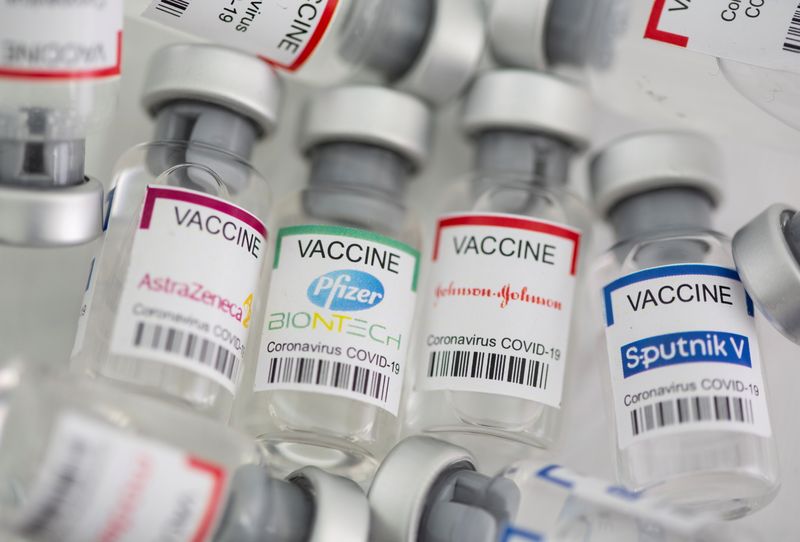By Julie Steenhuysen and Kate Kelland
(Reuters) - Vaccine makers Moderna Inc and Pfizer Inc (NYSE:PFE), with its German partner BioNTech, have been vocal in their view that the world will soon need COVID-19 booster shots to maintain high levels of immunity. What is less clear, however, is who should make that decision - and based on what evidence.
THE MODEL FOR FLU VACCINES
Public health officials have a well-coordinated mechanism, first established in 1952, for determining when seasonal flu vaccines should be updated to cope with fast-mutating strains of influenza.
The World Health Organization's Global Influenza Surveillance and Response System gathers data collected by national health authorities on circulating flu strains and, twice a year, uses that information to select the strains manufacturers should include in seasonal shots for the Northern and Southern (NYSE:SO) Hemispheres.
Some experts have suggested a similar model could be used to gather data on COVID-19 variants and advise drugmakers on what to include in vaccine updates.
However, another approach could be to mimic what happens with updates of many other infectious disease vaccines - where decisions are based primarily on what the drugmakers perceive is required. National health authorities are then free to assess clinical trial data and decide whether a particular version of a vaccine should be used in their country.
Currently, COVID-19 vaccine makers are taking this approach, making the call to develop and test variant-specific booster shots, and leaving it up to governments to buy them as they see fit.
WHAT EVIDENCE WILL BE NEEDED?
Some vaccine experts say there needs to be clear evidence that the current COVID-19 vaccines are failing to prevent infections and severe disease before countries embark on repeat nationwide vaccination campaigns.
They argue the decision on booster shots should be guided by data showing how vaccines perform in people in clinical trials and real-world settings, as well as in lab studies showing declining levels of antibodies in blood samples from vaccinated people.
So far, COVID-19 vaccine makers have shown that their shots offer strong protection for at least six months. But immunity may vary. Older people, for example, or those with compromised immune systems, may need boosters earlier than younger people with more robust immune systems.
Another important dataset known as “correlates of protection” – evidence from clinical trials showing the threshold level of antibodies required for vaccines to be protective – could help policymakers decide on whether boosters are needed, but this data is not yet available.
ADAPTED FOR A COVID-19 WORLD
Globally, the World Health Organization is putting together an expert advisory panel which would evaluate ongoing evidence on COVID-19 vaccine durability and emerging variants and then offer guidance for governments.
Although some experts have noted possible similarities with the global mechanism for updating flu vaccines, they also stress that it will need to be adapted for a COVID-19 world. More likely, they say, is that global guidance will be adapted by nations or regions to target local needs.
For example, the U.S. Centers for Disease Control and Prevention is developing its own risk assessment framework to determine what evidence is needed to recommend a modified vaccine.
The CDC and other U.S. health agencies have their own
studies underway to assess vaccine efficacy, including in older populations and children, and monitor the impact of new variants.

In Britain, Public Health England and the National Institute for Biological Standards and Control are working with global agencies on an "Agility Project" to track and test the impact of viral mutations and new variants on COVID-19 vaccine development.